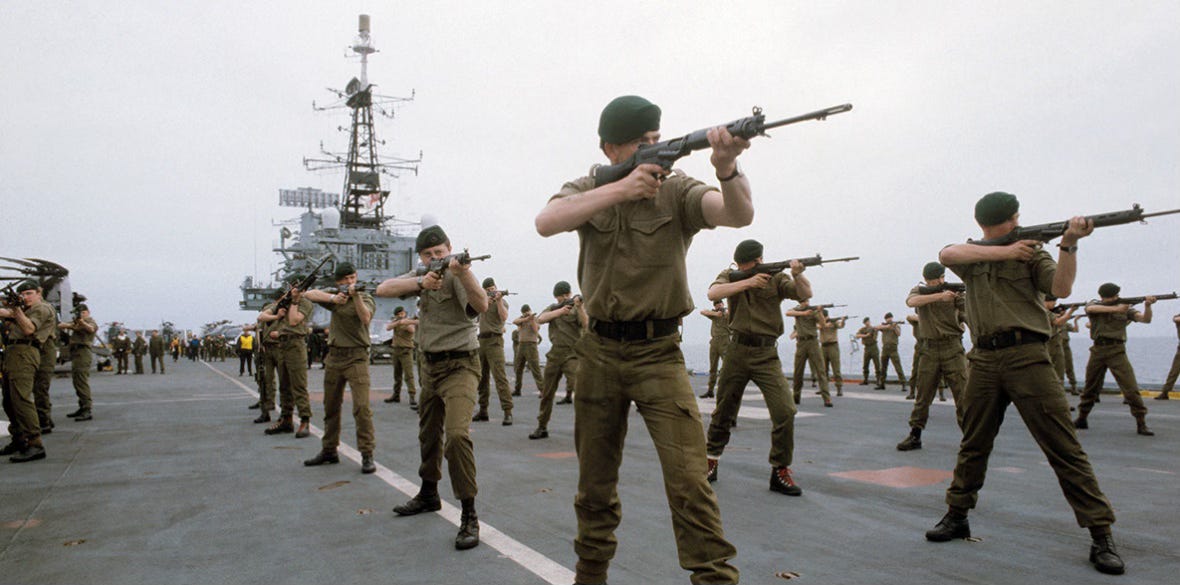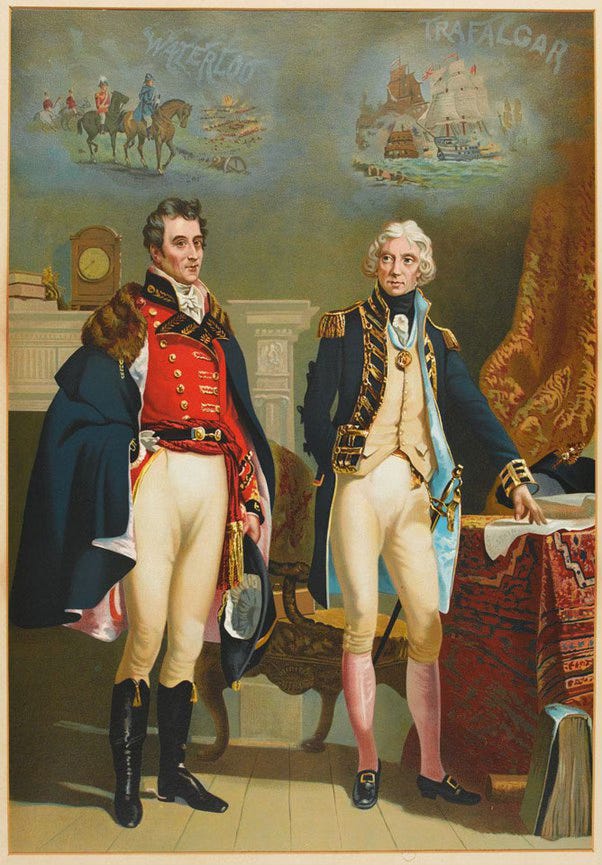The British Way of War and Corbett are Imperial? What nonsense.
Strategic experience and geographic realities quickly snap things into focus for island nations.
After the 1950s, some have argued that the British Way of War or, as I like to call it, the ‘British way of war and peace’ was outdated and purely developed as part of imperialist ambition and policy. This is, frankly, nonsense and drivel.
During the 1950s debate took place about the future of defence policy and strategy as Britain moved away from Empire and back towards its more normative status as a medium power dependent on security by sea, as it always had been. The fact that this debate should have resulted in Britain returning to its pre-empire approach to defence strategy and how it resolves conflict, and instead, the process––if process is the right word––concluded that faking it as a land power was a better solution is another story.1 History shows that islands that think they are land powers are doomed to failure because, in short, they do not have the resources to sustain war and conflict that continental powers do. Concurrently, they are also inherently vulnerable to attack on their home shores and the methods of how resources flow in to enable national survival. Therefore, the defence of the island comes before foreign policy because island powers cannot fight and win abroad in any form when the home nation and its logistics are not secure. Anyone with a rudimentary understanding of war and conflict knows that logistics make or break the outcome of any engagement, large or small.
After the 1960s, Britain came to the wrong conclusion and abandoned its strategic experience by ejecting an understanding of the harsh geographic realities of what it meant to be an island. Politicians wanted to avoid making tough decisions, including on finances, so they soaked up technocratic and tactical operational arguments put forward by not the sharpest of minds. These voices could not be bothered to study history past a few Second World War tactical engagements. The examples used were often based on manipulation of facts limited to aerial engagements over London in the summer of 1940 or crossing the Rhine in Germany in 1945. The result for Britain was abandoning its bespoke global capable navy that worked in close collaboration with a highly professional expeditionary army. Winning wars for Britain was a matter of creating alliances that saw friendly continental powers with shared interest in defeating a common enemy. This does not rule out independent operations but those operations were first and foremost about island security and direct interests that were often related to the former. What Britain bought to alliances was bespoke professionalism in the form of seapower and other specialisation that bought an edge to the alliance over an enemy. This was not an imperial matter; it was something that experience had taught Britain since at least the 1500s. Principally, how to maximise its power based on the limited resources it has, financial and physical. Today, this question remains in decision-makers' minds; the answer has always been the same because it wasn’t an imperial policy or doctrine, but the British way of war was a product of geographic fact.
Experience defeats guesswork, theory, and assumptions. The nonsense that has seen Britain ‘faking it’ as a land power since the 1960s was not rooted in experience. In the history of England, it is notable that the period of Empire was relatively short-lived compared to the overriding continual need for national survival and protection from invasion, arguably dating back to 1066 AD or even 54 BC. It was in the minds of Imperialists who sought glory on land that plunged Britain into abandoning the British way of war in August 1914. Equally misguided were those with different agendas seeking glory of another kind, after the Second World War. It wasn’t an imperial national mindset seen in the opening events of 1939––that no matter what vanity project land and air forces would pursue––the facts of an island quickly snapped reality back into focus. Britain survived the Second World War by fighting a global sea war, of which the campaign in the North Atlantic decided its fate.
The British way of war has been maligned as imperialist because those against it know the arguments that historians such as Sir Julian Corbett proved with evidence and careful analysis using the very best methodology are fundamentally sound and yet to be disproven. Scratching below counterarguments reveals that those today who are against his arguments are the inheritors of misguided, if not imperialist, arguments that took new form in the 1960s. Therefore, arguments against the British way of war could be argued as imperialist, as the British way is one about the defence of home before ambition, irrelevant of the domestic structure or role of the state in the world. To some degree, this is why the legacy of the 1982 Falklands War was quickly suppressed after 1986, as it served as a rude awakening to HM Gov that the policy of the 1960s, disconnecting from the world, was the wrong one. 1982 was a watershed moment that pushed open doors on what it meant to be a global medium power with scarce resources, one the politicians and decision-makers had been purposefully miseducated about over decades and fooled into the idea of a land-power confined to local regional matters. Worse, few knew how to educate decision-makers back to the British way, such was the success in the 1960s to malign Corbett, seapower and past strategy, nor could the state turn to places that had once stood as guardians to it, such as the Admiralty. Seemingly too much time had past, and new generations who knew no different and who were poorly educated were entrenched across the military, civil service and politics. While the public had been put on a diet of sentimental claptrap of myths related to Britain’s war time achievements, often land-based, or land-based air power while the naval and maritime story was lost or made to sound outdated, continually negative or purposefully irrelevant to today.

Continental commitments for islands and more broadly, war, are ruinous for maritime powers (who cannot be secure without naval forces) like Britain for losing the essential ability to focus on the sea in exchange for dubious and unrealisable benefits. The British approach to its way of ‘war and peace’ pre-dated and survived Empire, even if it was abandoned. Corbett’s work analysed strategic experience (using evidence) by addressing the critical question of being a small, weak offshore power still reliant on international trade, economic engagement, maritime security, and alliances not through the lens of imperial conquest or personal bias.2
More to the point, others nor I are arguing about simply replicating the past in perfect detail. We need to use principles that Corbett outlines (note the book title is Some Principles,3 aka strategy is a living document for each generation to build on and add to) to inform how we think about the present, well aware, as Corbett was, that past practice will always be modified for the present context. I’d argue that those who discard the British way, on grounds such as ‘its imperialism,' are essentially saying we cannot learn from the strategic experience because we do not live in the same era, regardless of geography, let alone the same country. That puts Clausewitz (the closest to Corbett intellectually) out of court, along with every other strategic thinker since the dawn of time. The error in this way of thinking is that it assumes we cannot read across different eras and countries in which to kick-start our own contemporary process. This is what Corbett teaches us to do, blending strategic theory with hard-won British experience to develop some principles to underpin the evolving debate.
In short, history has low-hanging fruit in the form of wisdom to learn from. Maps are also important to study, particularly to the make-up of the Earth’s surfaces. Importantly, why reinvent the wheel when you can make it far easier to carry forward experience and refresh certain parts for our times?
Britain remains an island, with scarce resources physically and financially. It survives and wins when it has bespoke armed forces with maritime strategy at its heart. This isn’t imperialism, it's just plain common sense backed by centuries of experience.
I explore this whole issue and how this conclusion came about in in-depth in my PhD and forthcoming titles. I encourage those looking for expansion of my commentary here to turn to those when the time is right if you want to read a deeper conversation.
Andrew Lambert argues Corbett was a liberal (for his times). See, Andrew Lambert, The British Way of War and the Battle for a National Strategy, 2022.
Julian Corbett, Some Principles of Maritime Strategy, 1911.

